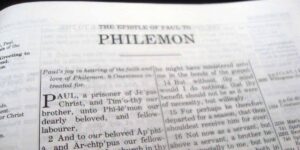The Book of Colossians
The resounding theme in Colossians is the preeminence and sufficiency of Christ in all things. The believer is complete in Him alone and lacks nothing because “in Him dwells all the fullness of the Godhead bodily.”
In this letter, Paul clearly teaches that Christ has paid for sin, that Christ has reconciled us to God, and that Christ gives us the pattern and the power to grow spiritually. Because Christ is the exact likeness of God when we learn what he is like, we see what we need to become. Since Christ is Lord over all creation, we should crown him Lord over our lives. Since Christ is the head of the body, his church, we should nurture of vital connection to him.
Writer of Colossians
Written by Paul, in the company of Timotheus (Timothy) – (Colossians 1:1), having been commissioned of God with an apostleship (job) in the dispensation of grace to write a book.
For more than two years the influence of his ministry reached “all who dwelt in Asia” (Acts 19:10). Epaphras must have heard Paul in Ephesus and then carried the gospel to Colossae.
Paul wrote the epistle from prison, but he did not indicate where he was imprisoned. Caesarea and Ephesus have been suggested, but the most probable place is Rome.
Date Written
During the two years that Paul was in his own hired house (A. D. 61-63), continuing to preach the kingdom of God (Acts 28:31). Paul wrote Colossians at about the same time that Mark wrote the Gospel of Mark. Written from Rome, during Paul’s imprisonment.
To Whom Written
To “the saints and faithful brethren in Christ which are at Colossae” (Colossians 1:2). A city in Asia Minor.
Purpose of Colossians
The purpose of the book of Colossians was to address the doctrines of false teachers. Paul had heard of the new believers in Colossae who had believed without seeing (signs) in the new dispensation of grace. He thanked God for them but was writing them because of the misleading of certain false teachers. Many think these were Gnostics, a group that claimed secret knowledge through angels or other powerful beings they called aions (out-flowing sources of “truth” that only the initiated supposedly had access to). There is some question, however, as to whether the Gnostics really were a problem among the believers in the first century. At any rate, the Colossians were being urged to worship angels and look to principalities and powers rather than to Christ. Others were promoting the keeping of religious works and tenets of Judaism, such as the keeping of feasts and dietary laws. Instead, Paul urged the Colossians to a religion less faith in Christ. Then, he advised them as to the worthy walk of the believer, with teachings very similar to those represented in the last three chapters of Ephesians.
Historical Setting
False teaching had taken root in Colossae. This teaching combined Jewish observances and pagan speculation; it is possible that this resulted in an early form of Gnosticism. This teaching pretended to add to or improve upon the gospel that, indirectly at least, had come from Paul.
Theological Setting
Paul unmasks the false teaching as “empty deceit… of men” (2:8), having the “appearance of wisdom” (2:23), but useless in fact. He declared that the addition of such things dilutes rather than strengthens the faith (2:20).
Recommended Bible Study Resources
ESV Study Bible – Study Bibles give you a deeper understanding of God’s Word with tools for life application like commentary, maps, charts, concordance, and study notes. Search our popular translations- NIV, ESV, NKJV, KJV and more!
Believer’s Bible Commentary: Second Edition – A Bible commentary is a written, systematic series of explanations and interpretations of Scripture. Commentaries often analyze or expound on individual books of the Bible, chapter by chapter and verse by verse. Some commentary works provide analysis of the whole of Scripture.
The New Strong’s Expanded Exhaustive Concordance of the Bible – The best concordance for word study! This exclusive new edition of a legendary classic puts generations of biblical research at your fingertips. A valuable tool for pastors, teachers, and students of the Bible.
Vine’s Complete Expository Dictionary of Old and New Testament Words – This classic word study resource allows you to study the meaning of biblical words in the original languages without spending years learning Greek or Hebrew. A great resource for students, seasoned pastors, and anyone who enjoys biblical word studies–even if they have little to no formal training in Hebrew or Greek.
Halley’s Bible Handbook – The beloved and classic Bible companion has been thoroughly updated, while retaining its time-honored features and Dr. Halley’s highly personal style, to offer even greater clarity, insight, and usefulness.
Click here to download or print the Bible outline “Colossians – The Preeminence of Christ“.






